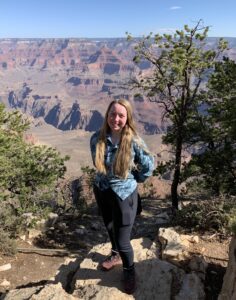 Where did you attend field camp?
Where did you attend field camp?
I attended field camp through my geosciences department at Fort Hays State University. We spent July camping out and doing fieldwork throughout Utah, Arizona, and Colorado. We visited some truly remarkable geological sites, including Bryce Canyon, Zion, and Grand Canyon National Parks; Dinosaur National Monument; Meteor Crater; Monument Valley; Horseshoe Bend and Goosenecks State Parks; and the Royal Gorge.
What did receiving the J. David Lowell Field Camp Scholarship mean to you?
Field camp is required for my geology degree, but it was very expensive. As someone who comes from a low-income family, I am so grateful for the support I received from the J. David Lowell Field Camp Scholarship. It paid for half of my field camp costs, which made expenses more manageable. I am very honored to have received this award. Not only did it support me financially, but winning the award also gave me more confidence in myself and my potential as a field scientist.
What did that experience teach you about the geosciences, yourself, and your future career?
Field camp felt like a culmination of the past three years of my geology classes. I learned to apply my knowledge of mineralogy, petrology, structural geology, and sedimentology into real-world field settings. Though I have considerable paleontology field experience, my field camp taught me a completely different set of field skills. Throughout field camp, I progressively learned how to be a field geologist. At first, I asked a lot of questions to make sure I was doing the projects correctly. Over time, I learned that I already knew how to “think like a geologist,” and that I just needed to work on trusting myself and applying it to the physical world around me. By the end of field camp, I was much more confident and sure of my abilities as a field geologist.
What opportunities did attending field camp provide that you wouldn’t have had otherwise?
We camped in the field throughout July, setting up and tearing down camp every 2–3 days. Though camping in desert regions of the west in the middle of summer posed its own challenges, I think that working and living in harsh conditions was a valuable experience for me. My field camp experiences will serve me well throughout my career as a paleontologist. It also gave me the once-in-a-lifetime opportunity to see so many wonders of the North American west in one magnificent trip, while bonding with other professionals and future scientists.
In your opinion, how important is field camp for geoscience students?
To me, field camp is extremely important for geoscience students to understand themselves, the field of geology, the methods of fieldwork, and how to perceive and think about the geological world which surrounds us. As my professor told us, field camp is “a rite of passage” to becoming a practicing geologist and field scientist. I personally believe that field camp is an absolutely integral part and highlight of a geoscience student’s academic career.
Why should individuals support field camp opportunities for students?
There are students across the country in poor financial circumstances, like myself, who would really struggle to afford to attend field camp on their own. Generous people who support field camp opportunities make it possible for people like me to experience field camp, which was such a wonderful and vital opportunity for me. I am so grateful for the support I received from the J. David Lowell Field Camp Scholarship.
